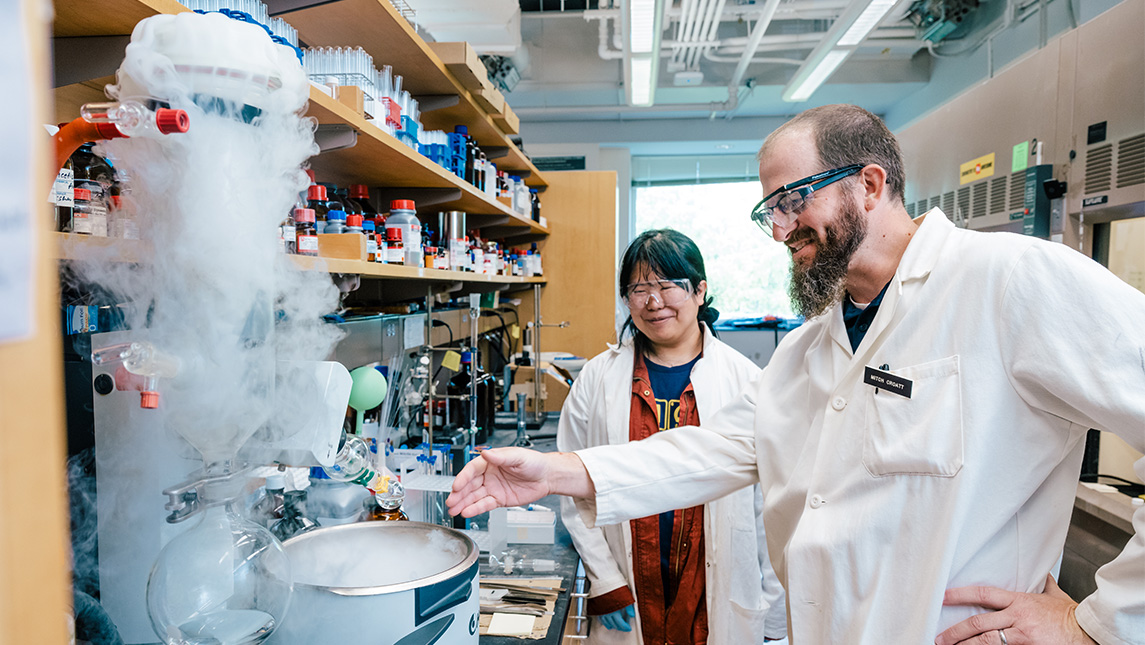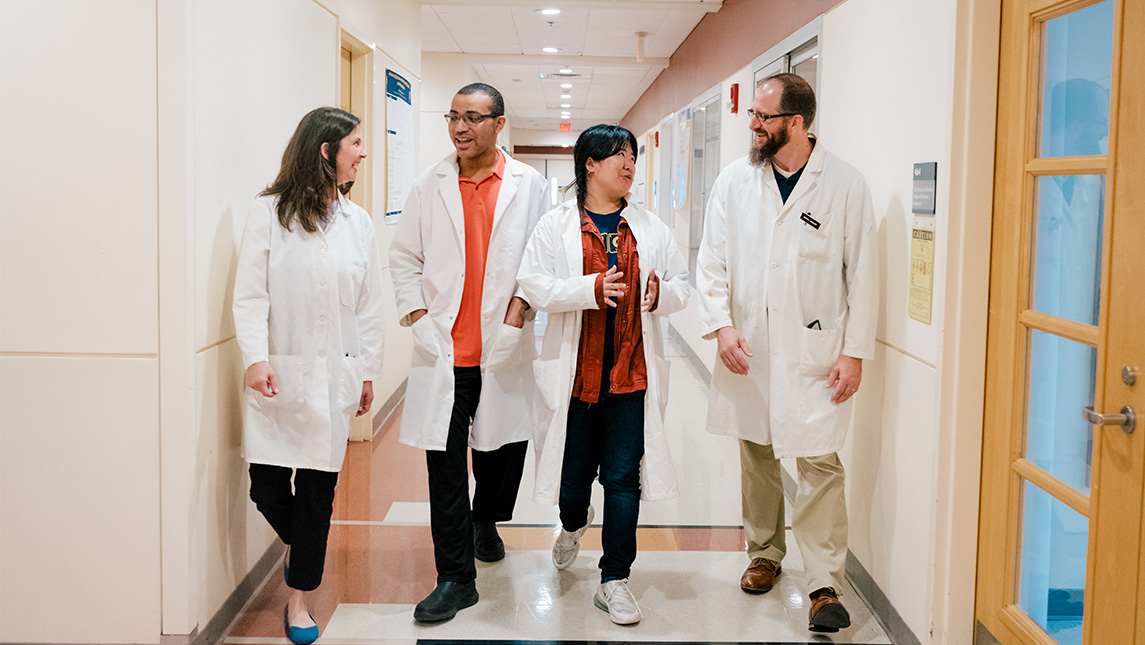UNC Greensboro’s (UNCG) Department of Chemistry and Biochemistry produced more of the 2023 National Science Foundation Graduate Research Fellowship Program (NSF GRFP) recipients than any other undergraduate chemistry department in the state.
The coveted fellowship, which is awarded to only 16% of applicants, covers three years of graduate school expenses through doctoral studies, inclusive of a $37,000 annual stipend, and lifts a huge burden for graduate students bound for science research careers.
Among this year’s recipients from across the country are five students who completed their undergraduate degrees in chemistry or biochemistry at UNC Greensboro (UNCG). This is a record for UNCG and an incredibly strong showing for a department that graduates 30 to 40 students each year. In fact, the chemistry department was third overall in producing 2023 NSF GRFP awardees, just behind University of California Berkley and University of California Los Angeles.
Something is happening over in the Sullivan building. Just like the fungi studied in its fourth-floor labs, young scientists are finding a warm and nourishing place to grow at UNCG.
Early Access to Research Stacks the Deck
Students can apply for the NSF GRFP between their last year of undergraduate studies and their second year of graduate school. Undergraduate accomplishments are application builders for the award, which was established in 1951 to encourage STEM career building. Historically, recipients go on to be major innovators in science, enhancing the prestige of the fellowship.
Spartan alumni Jonathan Dean ’23, Runzi Li ’22, Jennifer Obike ’22, Christopher Roberts ’21, and Robbie Shepherd ’22 received the fellowship this year. Dean and Li will use their NSF GRFP funding to finish graduate degrees at UNCG, while Obike attends Vanderbilt, Roberts is at University of Wisconsin, and Shepherd is at the University of California Santa Cruz.
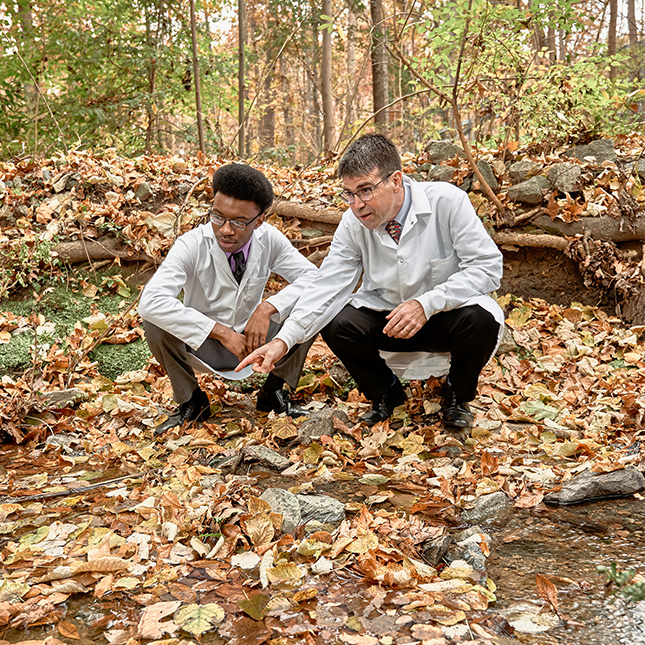
All are North Carolina natives who attribute their success to UNCG’s undergraduate research opportunities and the mentors they found in the Department of Chemistry and Biochemistry.
“My experience at UNCG opened doors for me because I started participating in undergraduate research as a sophomore,” Roberts explains. “Because of this, I was able to apply what I learned in class to the lab. It helped me understand the technique better.”
Moving on to graduate school at Vanderbilt has illuminated the research advantages that Jennifer Obike was afforded at UNCG.
“Very few of my peers at Vanderbilt had the opportunity to be involved in undergrad research,” she says. “However, I was able to work in Dr. Nicholas Oberlies’ lab for three years and made connections through faculty that led to additional research projects. I was fortunate to have great mentors who viewed my success as theirs.”
Hybrid Department Offers Unique Options
To understand what makes chemistry and biochemistry different at UNCG, consider how the department is modeled. Typically, universities with medical schools hold the most academic prestige, but student interests and practical workforce applications are changing the game.
UNCG’s chemistry and biochemistry department is unique because it is housed within the College of Arts and Sciences rather than associated with a medical school. Students gravitate towards a biochemistry major when they want to use their chemistry knowledge for human body applications, or when they are simply intimidated by chemistry.
“Our biochemistry major splits the difference between chemistry and biology,” explains Dr. Nicholas Oberlies, chemistry professor and head of graduate studies. “And this is where the world is moving. The lines are blurring between chemistry and biology. Nationwide, our workforce is seeking more scientists who can fill research positions for the development of drugs and other medical applications.”
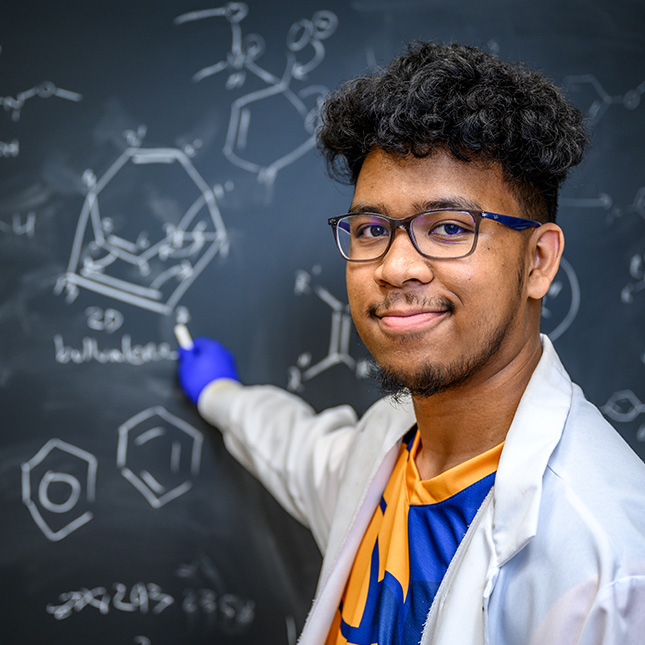
Because not all young scientists want to become doctors, UNCG’s chemistry and biochemistry department gives students another option. Biochemistry somehow feels less daunting to students and when they participate in undergraduate research, the concepts are easier to grasp.
Three of this year’s NSF GRFP recipients were biochemistry majors at UNCG. Logan Brown ‘23 is also a biochemistry major who is headed to Harvard for graduate school. Brown appreciates the blurred lines between chemistry and biology.
“At UNCG, biochemistry majors are working in the chemistry labs, chemistry majors are working in biology labs, and we have bio majors working in the chemistry labs,” Brown explains. “It is all interdisciplinary and we help each other and provide unique perspectives.”
Building Community Through Collaboration
Helping each other is a practice that starts from the top down in UNCG’s chemistry and biochemistry department.
“A major strength of our department and a passion amongst the faculty is giving undergraduates research experience,” says Dr. Mitchell Croatt, UNCG’s chemistry and biochemistry department head. “We work to make sure our research labs are supportive environments for students.”
Furthermore, the department’s size allows for a Goldilocks’ effect with respect to research: UNCG is big enough to give faculty access to substantial funding for research, but not so big that faculty aren’t teaching undergraduate classes. This environment encourages bright undergraduates to establish relationships with their teachers that lead to lab positions on important research initiatives.
“We’re big enough to have the infrastructure to train students, but we’re small enough to give individualized attention,” Croatt says.
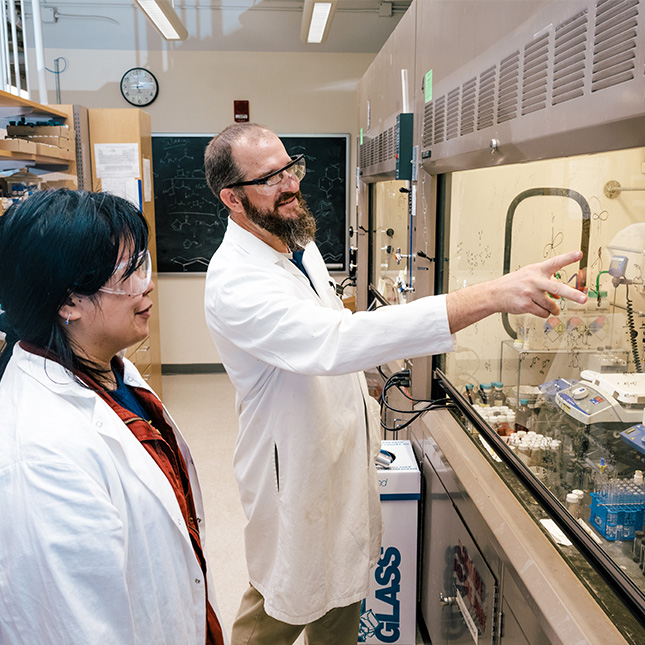
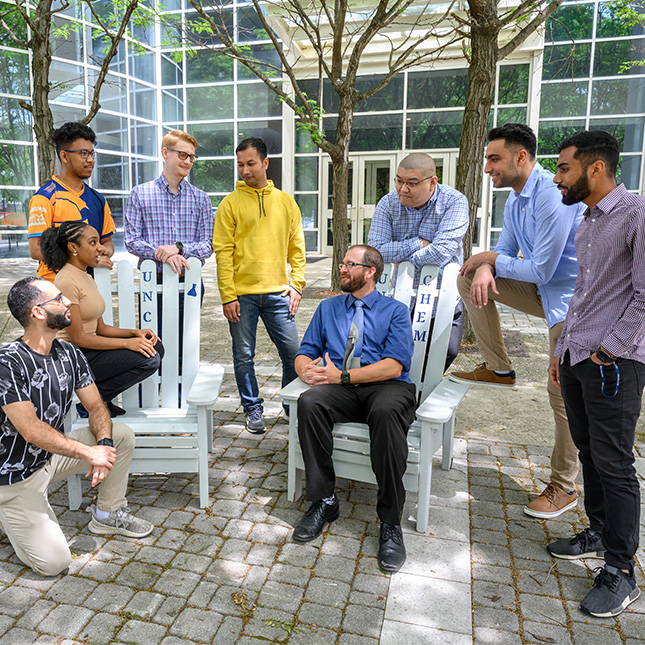
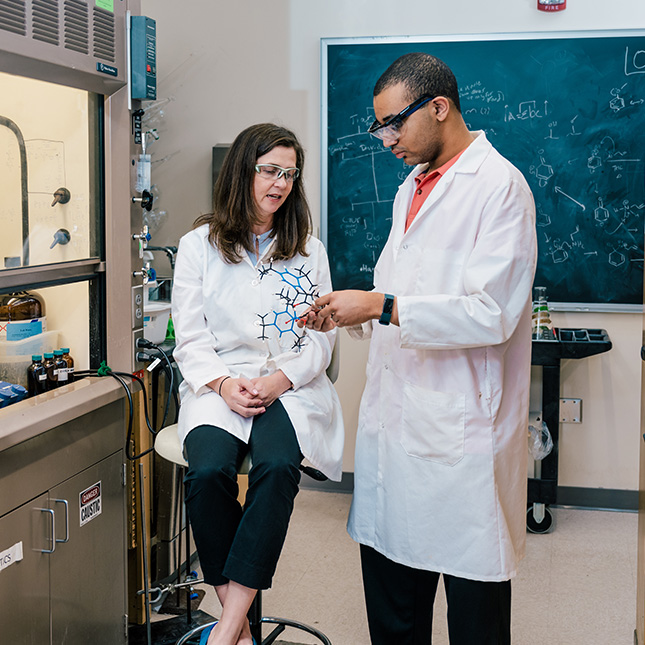
NSF GRFP recipient Christopher Roberts thrived in this environment. “The department was very close knit. Everybody really knew everybody, even professors to students, and undergraduates to graduate students, so I got a peek into graduate student life as a UNCG undergrad.”
Chemistry professor and winner of the 2023 Thomas Undergraduate Research Mentor Award, Dr. Kimberly Petersen agrees. “Access to research is part of our culture and it creates space for mentorship. A lot of people say that the department feels like family.”
Petersen has worked closely with NSF GRFP recipient Jonathan Dean for years. Dean began working in Petersen’s lab when he joined the MARC U-RISE program (formerly MARC-USTAR), which expands access to undergraduate research in order to diversify the workforce in research careers.
Petersen’s connection to Dean reflects a commitment to diversity that can be seen throughout the chemistry and biochemistry department, where the faculty is 40% female, and only 34% of the undergraduate students are white.
Dean doubts that he would have even known about the NSF GRFP, much less applied, if not for his work in Petersen’s lab and the support he received from throughout the department. “I’m especially thankful for the community I found at UNCG.” says Dean. “My time at UNCG helped me to build the confidence, communication skills, research experience, and connections that led to my NSF GRFP award.”
A Recipe for Success
People often compare baking to chemistry. In this particular recipe, you could say UNCG took five diverse North Carolina students, mixed them into a unique blend of chemistry and biochemistry courses, added a cup of undergraduate research and a pinch of mentorship, and then allowed them to rise.
Dr. Oberlies, full of pride in his students, states it in a more direct way.
“We take our students, including the undergrads, to conferences. They give a lot of presentations. We work together on publications. We give them hands-on access to instruments. But we don’t take everyone. For these five students who received the NSF GRFPs, UNCG gave them a springboard and every tool they needed to succeed, but they put in substantial work for this prestigious fellowship.”
Story by Becky Deakins, University Communications.
Photography by Sean Norona, University Communicatons, unless otherwise noted.
